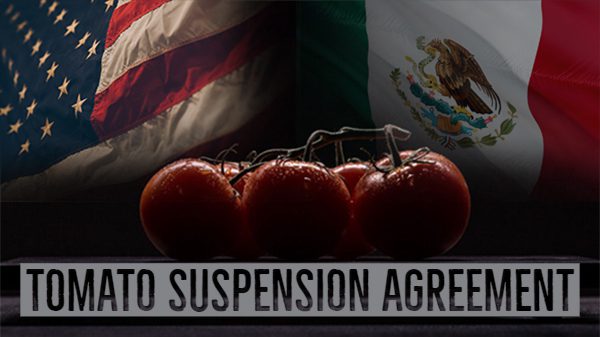NOGALES, ARIZ. (October 27, 2023)– With the month-long rebuttal period coming to a close earlier this week, more than 450 companies, organizations, associations and government leaders have now submitted comments urging the U.S. Department of Commerce to uphold the 2019 Tomato Suspension Agreement.
The comments come in opposition to the Florida Tomato Exchange’s (FTE) BB #:162441 efforts to strongarm Commerce into terminating the longstanding and successful Agreement and impose a new Tomato Tax on American businesses and consumers.
The most recent round of comments builds on the strong showing of public support from more than 400 businesses and organizations across 32 states, as well as 34 Members of Congress from both parties, who submitted filings in the initial comment period. This diverse group of advocates are united by a shared understanding that the impact of tomatoes imported from Mexico generate economic value far beyond their retail value, and support jobs, businesses, and tax revenue in local communities throughout the U.S.
Those U.S. groups who submitted comments in support of upholding the Agreement in the most recent rebuttal period include:
- Fresh Produce Association of the Americas BB #:144354, FPAA: Anti-dumping duties are not the answer to Florida tomato growers’ woes – Produce Blue Book
- NatureSweet, who just yesterday reinforced their support for the Agreement. NatureSweet supports preserving 2019 Tomato Suspension Agreement – Produce Blue Book
- 45 U.S. companies across eleven different states
- The United States Hispanic Chamber of Commerce, The San Antonio Hispanic Chamber of Commerce, and Tucson Hispanic Chamber of Commerce
- Industry powerhouses that include the Food Industry Association, National Council of Chain Restaurants, National Retail Federation, Retail Industry Leaders Association.
- U.S. growers of tomatoes, including Mastronardi Produce USA, Inc. and Wholesum Family Farms
“The close of the rebuttal period does not mean those who value the Tomato Suspension Agreement will sit back and await Commerce’s decision. It was made clear through the numerous filings in opposition of termination that businesses, associations, growers, and local and state leaders alike stand in support of this Agreement. They understand that terminating the Agreement would have far-reaching and unjustifiable repercussions in their states — particularly in Arizona and Texas — and throughout the U.S.,” said Lance Jungmeyer, President of the Fresh Produce Association of the Americas.
“The benefits to the handful of wealthy Florida tomato tycoons pushing to terminate the Agreement are clear, but their gain would be America’s loss. The Agreement has been working for decades — and for the sake of the businesses that would lose revenue, the communities that would lose jobs, and the consumers who would get squeezed even further by higher prices at the checkout counter, we need to look at the big picture.”
Most recently, Commerce announced preliminary findings from its third administrative review of the 2019 Tomato Suspension Agreement (TSA), debunking the allegations by the FTE and yet again determining that the TSA functioned as intended and that the signatories have, in fact, complied with the numerous requirements of the TSA.
Furthermore, a recent analysis by economic experts at Arizona State University evaluating the impact of terminating the TSA found that termination would dramatically restrict the supply of fresh tomatoes, thereby reducing competition on grocery store shelves, raising prices for U.S. consumers at the check-out counter by an average of 52% nationally, and boosting the profits of a small handful of wealthy Florida tomato-growing conglomerates at the detriment of Arizona and other states’ economies. Those same experts also recently confirmed that the price of imports of Mexican tomatoes have not, in fact, contributed to any loss in market share by the FTE’s members.
In addition to the economic activity generated, an August study by economic experts at Texas A&M University found that fresh tomato imports from Mexico support 49,128 full- and part-time jobs across the United States in various supporting and related industries.
About the FPAA
The Fresh Produce Association of the Americas (FPAA) and its members help to ensure North America’s uninterrupted access to fresh, high-quality, healthy and delicious fruits and vegetables from Mexico. Founded in Nogales, Arizona in 1944, the FPAA has grown to become one of the most influential agricultural groups in the United States. Today, we provide a powerful voice for improvement and sustainability, serving the needs of more than 100 North American companies involved in the growth, harvest, marketing, import, and distribution of Mexican produce.



